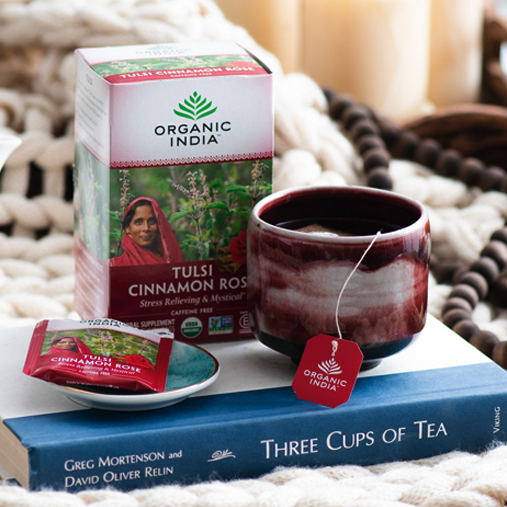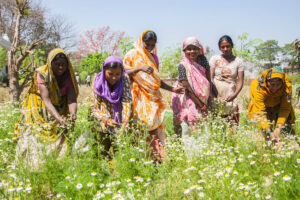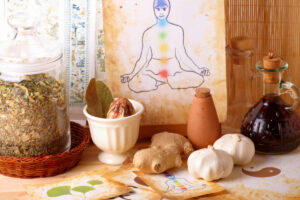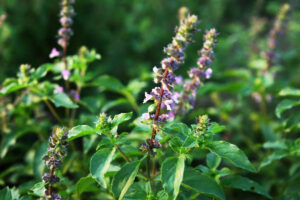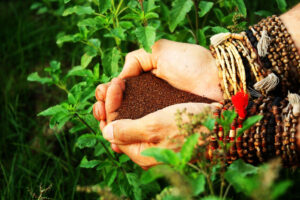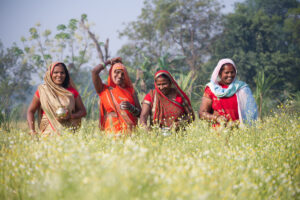Back
Adaptogens are specific herbs, foods, and mushrooms that support the body’s natural ability to deal with both emotional and physical stress. The word adaptogen is quite apropos to its meaning, because these helpful plants “adapt” to the specific needs of your body — whether physically, chemically, biologically. What’s even more impressive is that certain adaptogenic herbs used in Ayurvedic healthcare are especially beneficial for coping with the stress of seasonal changes in concert with your particular dosha type.
We would have to go back into the misty past to find the origins of Ayurvedic practice, because the system is arguably the oldest surviving form of healthcare. Ayurveda is based on holism — that all things are interrelated. This reflects the ancient Indian philosophy that life is an inseparable and continuous movement of consciousness in that everything that appears to happen is interdependent and flowing. Nothing, including one’s state of health, is either this or that; instead, all exists in an ever-changing state. To be healthy, then, is to achieve balance, according to Ayurvedic principles. This balance translates to helping the body, mind, spirit, and emotions find resting places respective to their natural tendencies to be happily balanced (in a state of equilibrium). The dosha system represents these tendencies and their relationship to a balanced state, and adaptogenic herbs help maintain, support, and promote this balance.
When it comes to doshas, we are often left scratching our heads in wonder and amazement at the ingenuity of ancient Indian philosophy that wisely characterized life into three basic categories: Vata, Pitta, and Kapha. These are known as the three doshas, or types of minds, bodies, emotions, and spirit relating not only to we human beings, but also to all of nature, foods, phenomena, and so-called inanimate objects. Everything that exists as the contents of consciousness tends toward one overriding dosha. So when the body is out of balance, and a particular dosha is in excess or a state of deficiency, Ayurvedic practitioners must aim to restore harmony in the context of the body and the environment.
Each expression of consciousness, whether human beings, animals, nature, or objects, comprises a particular dosha. We are all a composite of Vatta, Pitta, and Kapha, so when we are out of balance, one of these doshas is too great or insufficient.
A Spiritual Look at Stress
What Western psychology and medicine call stress, Ayurvedic practitioners see as being out of balance. Stress is an idea based upon relativity, rather than a disease within itself. When the mind and body are brought back into balance, then stress is resolved. This is because there is an underlying baseline of stillness that forever serves as the substrate of all existence. All that arises out of this stillness is buffeted by the expressions and actions of consciousness and is subject to change, growth, decay, illness, prosperity, and so on.
The factor that causes the sensation of psychological stress is the egoic mind, which is the mind that has been psychologically conditioned to judge people and events as good or bad for the body. As such, thought is converted into a belief system that creates a sense of self that we call “me,” or “I.” It is this personal self that reacts to the challenges of life, in accordance with its psychological tendencies. Thus, stress is created by the mind because of preconceived beliefs.
While Western medicine seeks to numb or alter the mood, such treatments do nothing to alter the conditioned mind’s propensity to worry, fear, or dread — or to avoid what are perceived to be stressful situations and people. On the other hand, Ayurveda is used to bring the doshas back into alignment so that the mind and body are able to transcend stress. This is accomplished with herbs, meditation, exercise, happiness and contentment, massage, application of oils, yoga, breathing exercises, proper diet, and other means that reflect a holistic paradigm.
One of the Chopra Center’s Vedic educators, Michelle Fondin, wrote that the Vata dosha is most affected by extreme stress, regardless of your predominant dosha type. Because Vata comprises space (akasha) and air (vayu), stressed out people can be found running around with too much energy, suffering from a racing mind, and obsessing over problems. Stress equates to constant movement of the mind, even if it results in lethargy of the body. The idea, wrote Fondin, is to stop the erratic movement and channel it more effectively.
In a Pitta type, stress may express itself as anger, criticism, and obsessive behavior. Pitta people desperately need to relax, because stress brings out the aggravation that comes from trying to control the environment. Driven by the fire element, Pitta types get into trouble when situations overwhelm them. Adaptogenic herbs can reduce Pitta fire to a gentle flicker.
Kapha people tend to internalize stress. Water and earth elements combine to weigh down Kaphas, making them sad and depressed. This leads to a sluggish body that loses motivation.
Perceived Effects of Stress
In Ayurveda, stress is said to reduce ojas, a word with no exact translation. Essentially, it refers to the innate substance in us that increases vitality, strength, and immunity, and prevents aging).
Since stress is only a perception — how we feel about something — then so are the symptoms of stress such as anxiety, depression, and apathy. This does not imply that we do not feel such things, but rather that they are caused by thought, which is an intangible, immeasurable factor, to which some of us gravitate and others do not. Stress is not hanging in the ethers like bacteria or motor exhaust.
When stressful thoughts persist, they are expressed as physical health imbalances, such as low energy, poor sleep, rashes, headaches, ulcers, digestive issues, hormonal irregularities, difficulty thinking and remaining attentive, and a weakened immune system — to name a few. The good news, say experts in psychology, is that by reframing your perception of a stressful event as a learning experience, or even a new challenge, you can avert health problems. To aid in that process, it helps to add adaptogenic herbs into your regular routine, including Amla, Guduchi, Ashwagandha, Shweti Musli, Shatavari, and Tulsi. Ashwagandha tea, for example, is a delicious seasonal treat that can help soothe stressors.
Changing Seasons, Changing Health
As we begin to enter the fall season, the body, mind, spirit, emotions, and environment undergo a shift according to the doshas inherent in consciousness. Autumn is known to be Vata in nature — dry, rough, windy, erratic, cool, subtle, and clear. Taking a few simple steps to balance Vata during this season can be quite beneficial. It’s always best to consult an experienced Ayurvedic practitioner to find out which herbs will ease you into the season, lower your stress rates, and keep your body feeling its best.

